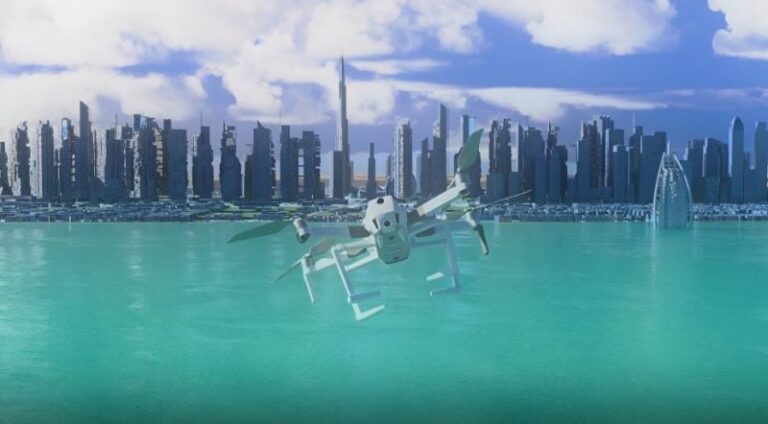Dubai Municipality and Dubai Civil Aviation Authority have successfully concluded the first phase of the Dubai Horizons project.
The project aims to enable the emirate’s preparedness to use drones and expand the scope of related services.
The project is planning standards for drone routes and dedicated landing zones in low-altitude airspace and selected airport locations in line with the country’s aviation and construction regulations.
Dubai Horizons will boost air navigation security and safety standards while supporting an investment ecosystem in the sector.
“Once completed, the Dubai Horizons project is set to substantially improve Dubai’s readiness to use drones and air delivery services with clear and well-defined routes. By providing the necessary data for drone operations with utmost precision and in accordance with best international standards and practices, the project is set to reinforce Dubai’s leadership and competitiveness on a global level,” said Dawoud Al Hajri, director general of Dubai Municipality.
Mohammed Abdullah Ahli, director general of the Dubai Civil Aviation Authority, said: “Jointly, with Dubai Municipality and other strategic partners, we succeeded in completing the first phase of ‘Dubai Horizons’ project, which seeks to advance and support Dubai’s plans to establish itself as a leading hub in proactively shaping and building the future.
‘Our ‘Dubai Sky Dome’ initiative, which aims to transform Dubai into a virtual infrastructure for drone systems by connecting places and buildings through mini runways and airports throughout the emirate, further fosters future-oriented thinking and innovation.”
The regulations governing the use of drones in Dubai particularly Law No (4) of 2020, are key to the advancement and progress of drone systems, Al Ahli emphasised. The law outlines regulations pertaining to the use of drones along with the responsibilities of the Dubai Civil Aviation Authority and other government entities.
Dubai Municipality is offering offer digital geospatial twin databases of Dubai, including 3D maps of all city landmarks and facilities to the relevant partners in the project. It will also provide hi-tech geospatial solutions, planning standards, and data inversion on a land classification and regulation list.
First phase conducted at Dubai Silicon Oasis
Held in Dubai Silicon Oasis, the first phase of Dubai Horizons included a study, analysis, and evaluation of the existing regulations, legislation, policies, and laws related to low-altitude airspace planning, drone operations, privacy policy, and air navigation safety.
Meetings were held to identify and document the main challenges and implement a pilot project.
The pilot project helped evaluate the application of proposed planning requirements and determinants by creating 3D maps of the planned routes for drones and aircraft landing locations.
A working group was formed to provide recommendations for the ideal future scenario and to establish protocols that lay down clear steps to various processes and solutions.
In July, Dubai Municipality signed cooperation agreements and a memorandum of understanding (MoU) with the Dubai Civil Aviation Authority and the Dubai Integrated Economic Zones Authority (DIEZ) to develop a framework for the Dubai Horizons project.
Drones, unmanned aerial vehicles (UAVs), urban air mobility, and electric vertical take-off and landing aircraft are gaining prominence as the world looks to more advanced and sustainable forms of transport to address growing urbanisation and climate change impacts. They were also a key focus at the recent Dubai Airshow.
According to Precedence Research, a consultancy firm, the global unmanned aerial vehicle (UAV) drones market size was estimated at $22.68bn in 2021 and is expected to hit over $102.38bn by 2030, with a registered compound annual growth rate (CAGR) of 18.2 per cent over the forecast period 2022 to 2030.



